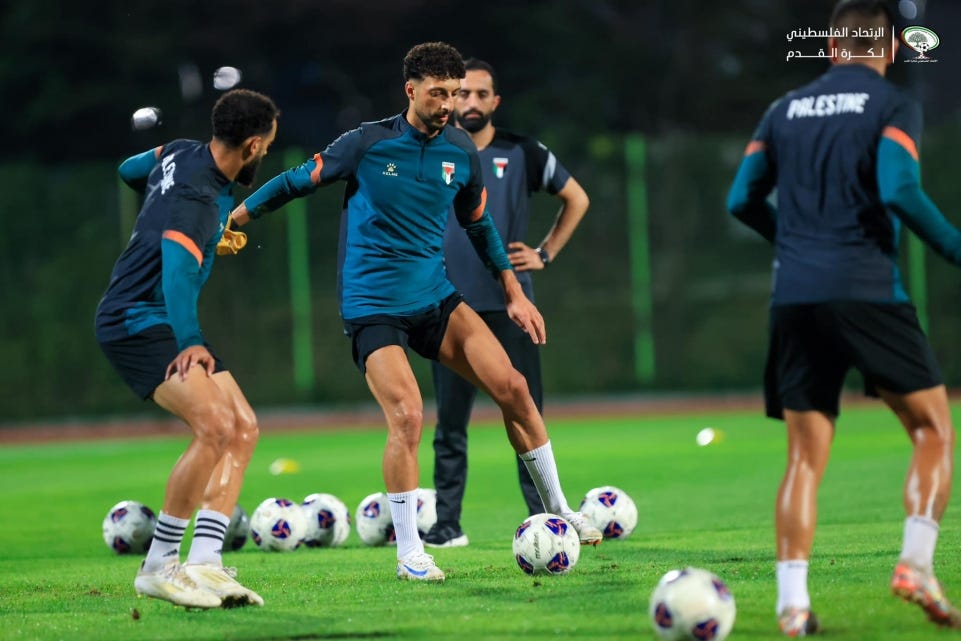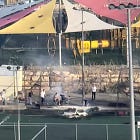Palestine closing in on World Cup history
Despite the odds stacked against them, Palestine continues to fight for a place on football's biggest stage, embodying the resilience of a nation striving for recognition on and off the field.

Welcome to Sports Politika, a media venture founded by investigative journalist and researcher Karim Zidan that strives to help you understand how sports and politics shape the world around us. Our mission is to offer an independent platform for accessible journalism that raises awareness and empowers understanding.
If you share this vision, please consider supporting us by joining our community and becoming a paid subscriber.
As Gaza faces continued devastation and the threat of a broader Middle East conflict looms, Palestine stands just a few matches away from making history by qualifying for the 2026 FIFA World Cup.
The Palestinian national team—nicknamed ‘The Fedayeen’— reached the third round of FIFA World Cup qualification for the first time in their history following a 0-0 draw against Lebanon in June 2024. This result saw them secure second place in their qualifying group behind Australia and saw them qualify for the 2027 AFC Asian Cup.
Palestine is now one of 18 remaining sides in Asia vying for a spot in the expanded 48-team World Cup in 2026, which is scheduled to take place in the United States, Canada and Mexico. The remaining teams will now be divided into three groups of six and will play home and away fixtures, with the top two from each pool guaranteed a place at the upcoming tournament.
Palestine is scheduled to open its campaign in Group B against South Korea. Iraq, Oman, Kuwait and Jordan are the other sides in the group.
Under their Tunisian coach Makram Daboub, the Palestinian team arrived in the South Korean capital of Seoul to complete preparations for the match. Daboub’s side reached the knockout rounds of the Asian Cup for the first time at the start of this year and will be hoping to carry their momentum forward despite amid an ongoing war with no end in sight.
Football in the time of war
Over the past 11 months, more than 41,000 people, including 16,000 children, have been killed by Israeli forces. More than 89,000 Palestinians have been injured while at least 10,000 are feared still buried under rubble. An estimated 1,139 people were killed in Israel during the Hamas-led attacks on October 7.
Israel’s assault on Gaza has also laid waste to the strip’s infrastructure, razing entire neighbourhoods and destroying agriculture, libraries, universities, and hospitals alike.
Palestinian sports have not been spared in Israel’s ongoing war. All of the city’s football stadiums have been destroyed or partially damaged, while a total of 49 other sports facilities have suffered similar fates. According to the Palestinian football association (PFA), more than 343 athletes have been killed since October 7, including 241 football players (67 children and 174 adults).
Among the footballers killed was Palestinian legend Mohammed Barakat, Gaza’s first centurion of goals and a former national team player known as the “Legend of Khan Younis.” Shortly before he was killed, Barakat released a tearful message on social media, bidding farewell to his loved ones while bombs could be heard falling in the background.
Barakat’s former teammate, Mohammed Al-Baaz, was killed in an Israeli airstrike in the Jabalya refugee camp earlier this week.
Mounting pressure to sanction Israeli football
In May, the Palestinian Football Association (PFA) submitted a proposal to sanction Israel on the grounds of human rights and humanitarian law violations committed in the Gaza Strip and the occupied West Bank. Since then, several federations and NGOs have filed submissions to FIFA in support of the PFA’s bid.
Despite growing pressure, FIFA has repeatedly delayed making a decision on the issue, missing its own deadlines. Last week, the organization once again postponed its review of the PFA's proposal, pushing it to October when the FIFA council is set to meet.
“FIFA has received the independent legal assessment of the Palestine Football Association’s proposals against Israel,” FIFA said. “This assessment will be sent to the FIFA Council to review in order that the subject can be discussed at its next meeting which will take place in October.”
Meanwhile, pressure continues to mount on FIFA from various stakeholders. Last week, three Jewish NGOs—The International Legal Forum, National Jewish Advocacy Center, and Project Max—sent FIFA a letter expressing concern about the “hateful, racist and illegal campaign being waged…to expel Israel from FIFA.”
The letter, which was acquired by Sports Politika, went on to make a case for how the “politicized Palestinian campaign” has no legal basis or merit, even going so far as to suggest that FIFA would stand accused of antisemitism if it sanctioned Israel.
“We are also deeply concerned that singling Israel out for opprobrium in such discriminatory manner could potentially implicate the FIFA Council in allegations of antisemitism according to the most widely endorsed and respected definition of antisemitism, pursuant to the guidance of the International Holocaust Remembrance Alliance,” read the letter.
“In order to indeed keep football as a force for good and politics out of sport, FIFA must once and for all give a ‘red card’ to this relentless Palestinian campaign of hate against Israel, and dismiss this politicized and mendacious attempt to exclude the Jewish state from ‘the beautiful game.’”
While the PFA’s efforts to impose sanctions on Israel face mounting obstacles, the Palestinian national team inches closer to an unprecedented World Cup qualification. they do so against the backdrop of immense challenges. And though the ongoing war on Gaza casts a dark shadow over their historic campaign, the team continues to fight for a place on football's biggest stage, embodying the resilience and determination of a nation striving for recognition both on and off the field.
Related Reading:
Sports Politika is a media platform dedicated to the intersection of sports, power and politics. If you like what you see, upgrade to a paid subscription ( or gift a subscription if you already have your own). We would appreciate if you could also like the post and let us know what you think in the comment section below.






